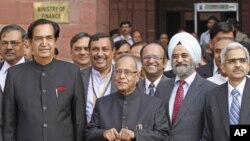India’s finance minister is optimistic the country’s economy is reviving after a disappointing slowdown in the past year. But there are fears a government weakened by recent electoral losses and unreliable coalition allies may not be able to return the economy to a high-growth path.
Finance Minister Pranab Mukherjee said India’s economic performance in the past fiscal year was disappointing, with growth likely to be about 6.9 percent instead of the expected nine percent.
But he says recent data suggests the worst is behind and growth will bounce back to 7.6 percent in 2012-2013. Minister Mukherjee was unveiling the country’s annual budget.
"Numerous indicators pertaining to this period suggest that the economy is now turning around," he said. "There are signs of recovery in coal, fertilizer, cement and electricity sectors. These are core sectors that have an impact on the entire economy. India’s manufacturing appears to be on the cusp of a revival."
Cut in subsidies planned
As concerns grow about the country’s high fiscal deficit, Mukherjee promised to cut the government’s huge bill on subsidies, mainly for food, fuel and fertilizer.
He says it will be cut from 2.5 percent of gross domestic product to 1.7 percent. He said capping subsidies will help bring down the fiscal deficit to 5.1 per cent from 5.9 per cent last year. Several economists called that too modest, while others questioned whether the government could achieve its target.
Mukherjee also emphasized the need to speed up economic reforms and policies to reinvigorate investment and consumer demand.
"We are now at a juncture where it is necessary to take hard decisions. We have to improve our macro-economic environment and strengthen domestic drivers to sustain high growth. We have to accelerate the pace of reform," said Mukherjee.
Hard decisions
But there are doubts about the government’s ability to actually take those hard decisions and push reforms, which have been stalled in the past by its coalition partners.
One of its most fractious allies, the Trinamool Congress, has already demanded a rollback in a recent proposal to hike rail fares, highlighting the government’s difficulties in implementing unpopular steps.
Prime Minister Manmohan Singh admitted there were problems in achieving political consensus on contentious measures such as cutting fuel and fertilizer subsidies.
"These are compulsions of managing the coalition," he said. "There will be difficulties, there have been difficulties, but ultimately if the government is to govern, it must have a sustainable strategy for managing the economy."
The Congress Party, which heads the governing coalition, fared poorly in recent regional elections, making it more vulnerable to pressure from its coalition partners.




